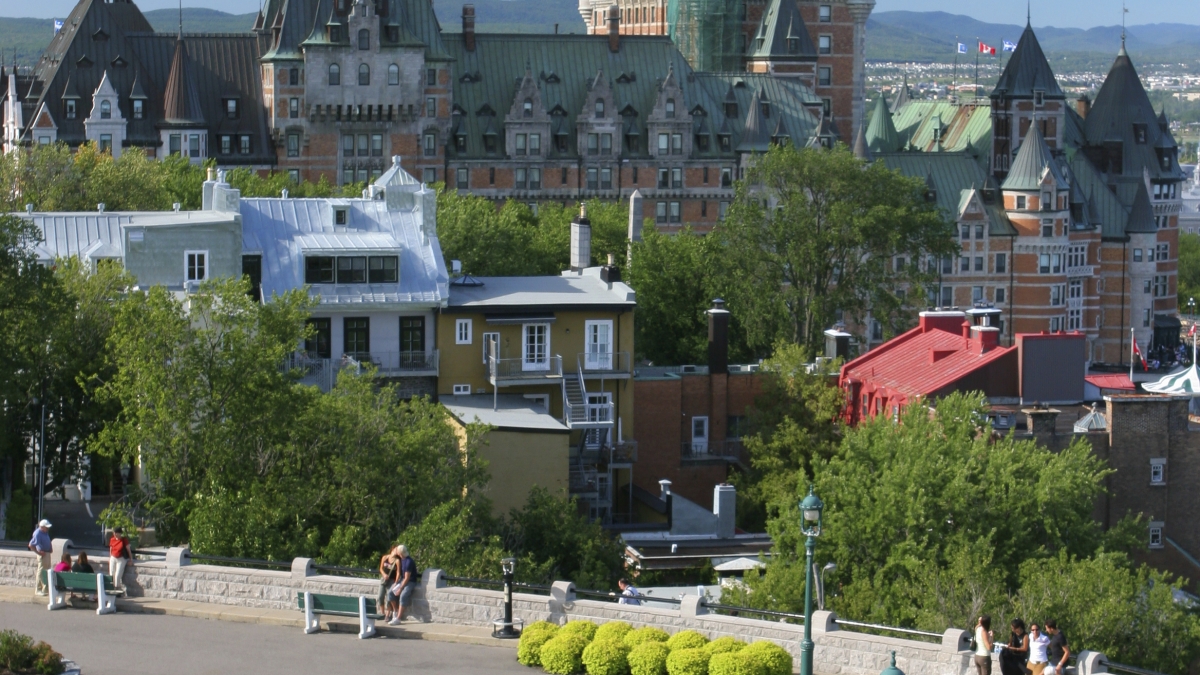Students looking for French immersion head to Canada on a budget this summer

The School of International Letters and Cultures’ study abroad programs are among the longest running and most prestigious at Arizona State University. Founded in 1981, and directed by knowledgeable, world-class faculty, the programs offer students the opportunity to experience and study international humanities and learn languages firsthand while earning credit toward their degree.
The school's very popular and affordable French Language and Québécois Culture in Québec, Canada program comes of age this summer when students go to Laval University in Québec City, Canada from ASU for the 21st year. The longest-running of the French immersion programs at ASU, the program provides students with a true immersion experience in one of the most beautiful cities in the world, so beautiful that UNESCO couldn't decide which monument to declare a World Heritage site and so declared the entire city to be one. The city boasts cobblestone streets, stone buildings hundreds of years old, internationally renowned festivals and events, breathtaking landscapes, and the sounds of French language everywhere – all without even crossing the Atlantic.
Because French is an official language in 54 countries for more than 200 million people, and is the official language of the United Nations, the EU, NATO, Interpol, WTO, FIFA, the Red Cross, and numerous other international organizations, students who speak French and understand French/francophone media sources, have a big advantage in any professional field in the world. Canada, in particular, is the largest trading partner of the United States and Québec plays an important part in that relationship as our ninth largest trading partner. Learning French language and understanding francophone culture in Canada gives students a significant advantage in a U.S. job market that is increasingly globally connected.
Québec City, which recently celebrated its 400th anniversary, is the capital of the largest francophone community in North America. Laval University is one of the oldest francophone universities in North America, and has one of the best rated French immersion programs in the world. These locations provide the backdrop to the program, allowing students to interact in French with other students from all over the world.
Adding to the immersion experience, students live with Québécois host families during the four- or eight-week program.
"Studying abroad in Québec was my first French immersion experience, and I am so happy I went," says Stephanie Williams. "I saw a huge improvement in my French skills, I made friends from around the world, there were always fun things to do in the city and at the university, and Québec is absolutely beautiful. I would love to go back one day."
Bethany Ngai also benefitted from her immersion experience in the program. "The Québec program is a true French language immersion experience," she says. "It is a sophisticated program with tons of opportunities to explore the city and spend time with native Québécois students and other students from around the world, all the while communicating primarily in French. My comprehension improved greatly from my time there, and I would recommend it to any French student wanting to push themselves to the next level. If I could, I would love to go again."
At Laval University, students take between 6 and 8 credits, choosing from a range of courses from FRE 101 through graduate classes. All students in the program complete a placement test in order to ensure correct level placement. Beginner and intermediate students take grammar, conversation, and phonetics classes while more advanced students have the opportunity to take classes in culture, literature, folklore, and film. The instructors are native Québécois and specialists in teaching French as a second language.
Students appreciate the quality and opportunities of the program: "I am really proud of completing the program at Laval Univesrity in Québec," says Benoit Ngolo. "I experienced cultural diversity. I met with the people. I visited the old Québec. I played soccer with students from Europe, Africa and Asia. Québec is a beautiful place to visit."
Kimberly Allen agrees: "Studying abroad in Québec gave me the opportunity to authentically experience another culture, be immersed in the French language, and boost my confidence in handling unfamiliar situations--all while earning credits and having the time of my life."
Besides taking classes, students have a wealth of other activities from which to choose. Laval University's team of animateurs organize workshops, conversation hours, bicycle trips, volleyball, dance classes, song and music sessions and film showings during the week. On the weekend, students choose to participate in activies such as whale-watching, rafting, and that authentic French-Canadian treat: the cabane à sucre where everything maple is the order of the day. True to their French heritage, the Québécois exhibit a real joie de vivre during the summer, so that the season is bookended by the Festival d'été de Québec, one of the largest international music festivals in the world and the Fêtes de la Nouvelle France, a festival celebrating New France in which tourists and locals dress in costumes from the seventeenth century.
"In the U.S., our study of French tends to be disproportionately centered on Paris when the French language has such a deep and lasting heritage right here in North America," says former program participant Charles St-Georges. "Québec is an incredibly rich gem that is often overlooked. This program has allowed me to get back in touch with my family's French Canadian roots and rethink my own identity as a citizen of North America."
Because this is an exchange program, all ASU financial aid and scholarship aid applies to this program, making it quite affordable. Students have the options of attending during the first session (May 13-June 14), the second session (July 8-Aug. 9), or both.
For more information about the French Language and Québécois Culture in Canada program contact faculty director Helene Ossipov at helene.ossipov@asu.edu.